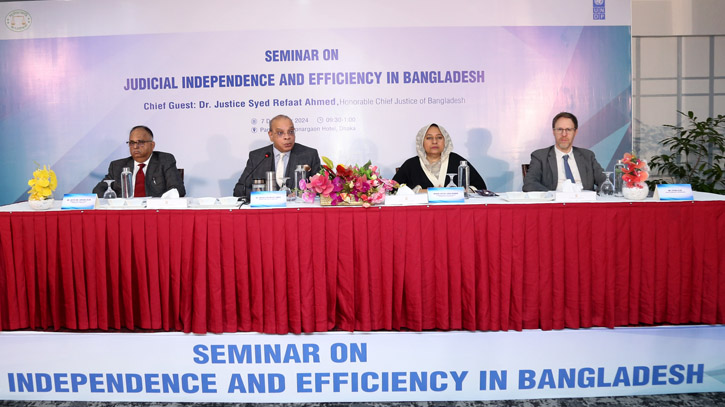
Photo: Messenger
The Constitution stipulates that the Judiciary should be independent and separate from the Executive. But effective separation of judiciary remains incomplete in contemporary political reality. In this context, consultation meetings were held with stakeholders on the establishment of a separate secretariat for the judiciary and the independence and competence of this department.
The meeting was held on Saturday (7 December) at Hotel Pan Pacific Sonargaon, Dhaka. Chief Justice of Bangladesh Dr. Syed Refaat Ahmed was present as the chief guest in the event.
Among others, the Resident Representative of UNDP Bangladesh, Mr. Stefan Liller and Judges of both High Court Division and Appellate Division of the Supreme Court were present in the event.
The Chief Justice of Bangladesh delivered the speech as the Chief Guest of the event. In his address he mentioned, “judicial efficiency is not merely an administrative goal but a moral imperative”.
About his assuming the Office of 25th Chief Justice of Bangladesh he mentioned that “this role is not merely a position of leadership, but a solemn trust bestowed by the people of this nation to uphold fairness, equity, and ensure access to justice for all, irrespective of their status or circumstances”.
He continued, to reflect on the trust bestowed by the people on 21 September 2024 he unveiled a comprehensive Roadmap for Judicial Reform. He further stated that the roadmap for judicial reform is a cornerstone of his vision to strengthen the judiciary and its capacity to serve the people with integrity and efficiency.
He assured that he has already taken decisive steps to establish the foundations for true separation of powers through initiating the process of creating a separate Secretariat for the Judiciary. He also mentioned that he proposed to form a Judicial Appointment Council to institutionalize transparency and meritocracy in the appointment process of apex court judges. He continued, the preparation of Posting and Transfer Guidelines for District Judiciaries, aimed at fostering consistency and fairness in judicial postings is under process.
Regarding the restoration of Supreme Judicial Council, he mentioned that “in reinforcing the judiciary's independence from the legislative branch, we have restored and strengthened the Supreme Judicial Council following the disposal of the 16th Amendment review case. This pivotal move effectively eliminates the provision for Parliament to impeach Supreme Court judges, ensuring that the judiciary remains free from undue political influence”.
He expressed that upon his assuming the office, he instructed the Supreme Court Registry to adhere to the 12-point directives which include the maintenance of an unblemished code of conduct, the eradication of monetary corruption, the provision of swift and seamless services to seekers, and the assurance of a hassle-free experience for all.
In his speech, he mentioned the introduction of a helpline for the Supreme Court to facilitate citizens' unimpeded access to the system to ensure transparency and efficiency.
To emphasis on judicial efficiency, he added, “judicial independence must be complemented by efficiency. A justice system that is delayed or inaccessible is a justice system denied”.
He assured that he is aware of the challenges posed by case backlogs, delays, and procedural inefficiencies. He commented, to address these challenges Bangladesh Judiciary requires a multi-faceted approach that combines innovation, diligence, and foresight.
Later part of his address, he called for the support of development partners to achieve these transformative initiatives. In particular, he stated that developing partners like UNDP can play a pivotal role as a catalyst, facilitating capacity-building programs, technological advancements, and policy development tailored to the judiciary's unique needs.
At the conclusion of his speech he emphasized that “at the heart of all our efforts lies a singular objective: to create a judiciary that serves the people”. He continued, “I envision a judiciary that operates as a model of accountability, where every litigant, regardless of their status or circumstances, feels assured that their case will be heard and resolved impartially. I envision a judiciary that bridges the gap between the legal system and the people it serves, making justice more accessible through technology, legal aid, and procedural reforms.
The seminar was started by the welcome address of Mr. Stefan Lilier, Resident Representative of UNDP Bangladesh. In his speech he highlighted the roadmap for the judiciary initiated by the Hon’ble Chief Justice of Bangladesh is a timely initiative. He further elaborates that for promotion and protection of human rights & freedom the efficiency and integrity of judiciary is crucial. He expected that the implementation of Roadmap introduced by the Chief Justice can play an important role in this regard. He said that in this regard UNDP is ready to provide expertise and the best practice guidelines.
Justice Ashfaqul Islam of the Appellate Division of the Supreme Court of Bangladesh, as the chair for the Supreme Court Special Committee for Judicial Reform also provided valuable guidelines in his speech. He mentioned, an independent judiciary is not just a theoretical ideal; rather it is a practical necessity for ensuring the rule of law and protecting human rights. He emphasized partnership across the borders as the judicial challenges are global in nature.
Besides, a technical session on judicial independence and efficiency was organized on the occasion.
Messenger/Tushar








